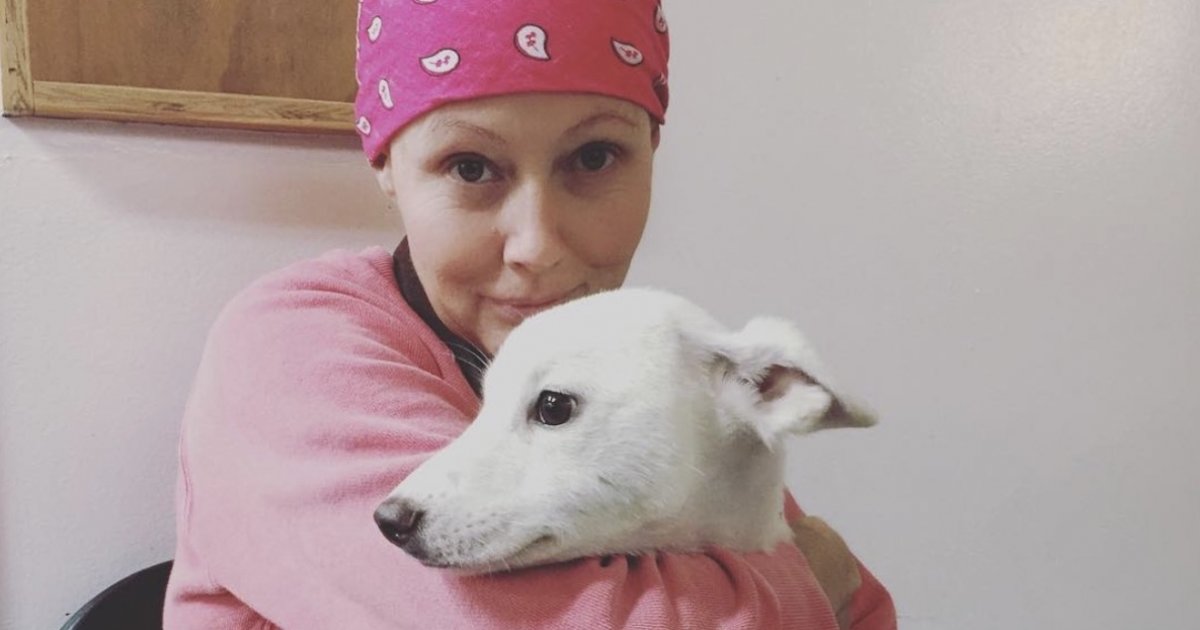Actor Shannen Doherty has just revealed an incredibly difficult diagnosis. The “90210” actor, 48, says that she was diagnosed with stage 4 breast cancer.
“I don’t think I’ve processed it,” she shared with Amy Robach on “Good Morning America” on Tuesday. “It’s a bitter pill to swallow in a lot of ways.”
Read MoreAnd in September of last year, she said in a post that laughter “has always been the best medicine.”
Now, she told Robach, herself a breast cancer survivor, “I definitely have days where I say, ‘Why me?’ And then I go, ‘Well, why not me? Who else? Who else besides me deserves this? None of us do. But I would say that my first reaction is always concern about how how am I going to tell my mom, my husband.”
Her diagnosis came about a year ago and Doherty chose to keep the news private as she worked on the “90210” reboot, “BH90210” – since cancelled — leaning on cast mates such as Brian Austin Green, she said.
Doherty’s close friend and former cast mate Luke Perry died in March 2019 while she was privately facing her diagnosis. “It’s so weird for me to be diagnosed and then somebody who was, you know, seemingly healthy to go first,” she said. “It was really, like, shocking. And the least I could do to honor him was to do that show.”
Shannen Doherty’s Cancer Journey
In 2015, Doherty found a lump in her breast that a biopsy determined was cancerous, she told Health. She initially tried to fight the disease through hormone therapy but, due to the cancer spreading to her lymph nodes, it was ineffective. A year after her diagnosis, she had a single mastectomy and underwent courses of chemotherapy and radiation followed by reconstructive surgery.
After facing cancer, Doherty’s relationship with her body changed. “I love that my body is strong and that it has the ability to fight something like cancer,” she said. “Importantly, my perception of sexy has changed. For me now, sexy is strength. Sexy is vulnerability. Sexy is compassion. Sexy is grace. Why should I care so much about the physical shell?”
At the time she acknowledged that the treatment had caused her to enter menopause, making pregnancy impossible without taking hormone pills. She decided against it due to fear that estrogen levels can increase the chance of cancer returning. While considering other options to become a mother, she expressed her concerns over how long she had until relapsing.
“We're having conversations about an egg donor, maybe adoption” she told Health. “But there's fear there. Am I going to last five years? Ten years? I certainly wouldn't want my 10-year-old burying a mother.”
Dealing With a Late-Stage Breast Cancer Diagnosis
Stage 4 breast cancer means that your cancer has metastasized and is no longer regionalized to the breast. While treatable, this cancer currently has no cure.
While we don’t know the specifics of Doherty’s breast cancer, the treatment for metastatic disease can vary significantly depending on features of an individual woman’s cancer.
Treatment options include hormone therapy, chemotherapy and targeted drugs. Sometimes surgery and/or radiation is considered. The goal is to keep you as stable as possible, slow the tumor growth and improve quality of life.
Hormone Therapies for Breast Cancer: CDK 4/6 Inhibitors
A new class of targeted therapy drugs called kinase inhibitors can now help treat some metastatic breast cancers, Dr. Erica Mayer of the Dana-Farber Cancer Institute, told SurvivorNet in a previous conversation. These drugs target two kinase proteins, called cyclin-dependent kinase 4 and 6, that normally regulate the cell cycle and division. There are three CDK 4/6 inhibitors available: palbociclib (Ibrance), ribociclib (Kisqali), and abemaciclib (Verzenio).
Dr. Erica Mayer explains hormone therapy options available for breast cancer patients
These drugs are primarily used in women with hormone receptor-positive and HER2-negative breast cancer. When they are combined with other hormone therapy, many women can have up to two years of their cancer not getting any worse. A common side effect was a decrease in white blood cells which can increase the risk of infection.
RELATED: An Overview of Treatment Options for Advanced Breast Cancer
What's Next for Breast Cancer and Immunotherapy?
Immunotherapy has been a game-changing treatment option when it comes to treating several cancers. But until recently, researchers hadn't had much success using the therapy to fight breast cancer. That's changing now.
Dr. Sylvia Adam talks about breast cancer and immunotherapy
"The question now becomes, is it only triple negative breast cancer that can benefit from immunotherapy, or are there other subtypes as well?" Dr. Sylvia Adams, a medical oncologist at NYU Perlmutter Cancer Center, said to SurvivorNet in a previous interview.
"If a tumor has the PD-L1 protein in it, that means there's already an inflammatory response, that the patient's immune system already recognized the tumor and was starting to work against it. The benefit of identifying such a strong biomarker in the triple negative subset will allow us to actually test for the presence and responsiveness to immunotherapy in other subtypes of breast cancer."
Learn more about SurvivorNet's rigorous medical review process.


